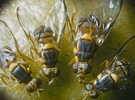A portion of Los Angeles County has been placed under quarantine for the Oriental Fruit Fly following the detection of 14 flies in the San Fernando Valley in the North Hills area. The quarantine zone measures 89-square miles, bordered on the north by the Angeles National Forest; on the south by the Ventura Freeway; on the west by Porter Ranch; and on the east by Hansen Dam Park. A link to the quarantine map may be found here.
To prevent the spread of fruit flies through homegrown fruits and vegetables, residents living in the quarantine area are urged not to move those items from their property. However, they may be consumed or processed (i.e., juiced, frozen, cooked, or ground in the garbage disposal) on the property where they were picked or disposed of by double bagging and placing in the regular trash, not green waste.
Following  the principles of Integrated Pest Management (IPM), agricultural officials use “male attractant” technique as the mainstay of the eradication effort for this invasive species. This approach has successfully eliminated dozens of fruit fly infestations in California. Trained workers squirt a small patch of fruit fly attractant mixed with a very small dose of an organic pesticide, Spinosad, approximately 8-10 feet off the ground on street trees and similar surfaces; male fruit flies are attracted to the mixture and perish after consuming it. The male attractant treatment program is being carried out over an area that extends 1.5 miles from each site where the oriental fruit flies were trapped.
the principles of Integrated Pest Management (IPM), agricultural officials use “male attractant” technique as the mainstay of the eradication effort for this invasive species. This approach has successfully eliminated dozens of fruit fly infestations in California. Trained workers squirt a small patch of fruit fly attractant mixed with a very small dose of an organic pesticide, Spinosad, approximately 8-10 feet off the ground on street trees and similar surfaces; male fruit flies are attracted to the mixture and perish after consuming it. The male attractant treatment program is being carried out over an area that extends 1.5 miles from each site where the oriental fruit flies were trapped.
While fruit flies and other invasive species that threaten California’s crops and natural environment are sometimes detected in agricultural areas, the vast majority are found in urban and suburban communities. The most common pathway for these pests to enter the state is by “hitchhiking” in fruits and vegetables brought back illegally by travelers as they return from infested regions of the world or from packages of home grown produce from other countries sent to California. Help protect California’s agricultural and natural resources; please Don’t Pack a Pest (www.dontpackapest.com) when traveling or mailing packages.
The Oriental Fruit Fly is widespread throughout much of the mainland of southern Asia and neighboring islands, including Sri Lanka and Taiwan, and it is known to target over 230 different fruit, vegetable, and plant commodities. Important California crops at risk include pome, stone fruits, citrus, dates, avocados, and many vegetables, particularly tomatoes and peppers.
For more information:
CDFA Pest Hotline
Tel.: +1-800-491-1899
cdfa.ca.gov/plant/off
Sign up for our daily Newsletter and stay up to date with all the latest news!
Subscribe I am already a subscriber